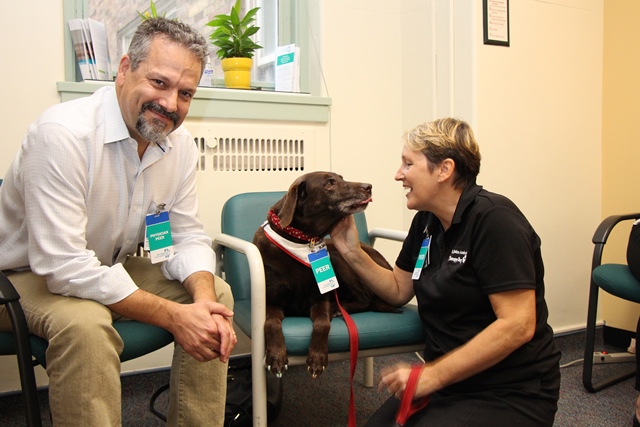By Justin Faiola
The Mental Health Commission of Canada states that health-care workers are 1.5 times more likely to be off work due to illness or disability compared to workers from other sectors. This figure illustrates the prevalence of mental health issues in society and that many people still suffer in silence, including those who work in health care.
As part of a robust employee mental health strategy, The Hospital for Sick Children (SickKids) recently launched a Peer Support Program for staff. The program is a confidential resource, offering individual mental health outreach and trauma support 24/7 to staff in need.
“For healthcare providers, the demanding nature of their work and the repeated exposure to trauma can challenge well-being and contribute to burnout, compassion fatigue or distress,” explains Kelly McNaughton, Manager of the Peer Support Program at SickKids. “The goal of the Peer Support Program is to improve the psychological health and safety of staff and penetrate the cycle of silence around the topic of mental health.”
While traditional peer support programs have been patient-centred, peer support as a formal workplace-based program is a relatively new and unique approach.
“Workplace peer support enables colleagues to help one another through some of the challenges we face both at work and in our personal lives,” says Kelly Anderson, Registered Nurse in the SickKids Emergency Department and a designated peer. “Peers act as a confidential ear to listen, and as a gateway to connect you with resources throughout the hospital that offer additional support when it is needed.”

The work to establish the Peer Support Program first began in 2016, when a SickKids steering committee was tasked with creating a mental health campaign to combat stigma. In 2017, McNaughton’s position was created to lead the development of a peer support program at the hospital.
Over the next six months, McNaughton met with hospital leadership and staff to better understand the culture and mental health needs of employees at SickKids, and recruited staff to become peers in the program.
Forty two staff, including clinical, non-clinical and research, completed training in December 2017 to become designated peers. Certified in assessment, communication skills, trauma principles and trauma response, peers provide confidential support to their colleagues in need. They listen, inspire, gently challenge and encourage while helping their colleagues deal with stress and personal concerns.
The Peer Support Program is also responsible for providing psychological support to staff after a traumatic event, such as a case where a child arrives at the Emergency Department badly injured or the death of a patient on an inpatient unit. Using the Critical Incident Stress Management model, peers and McNaughton, a clinical social worker, facilitate psychological defusings and debriefings. Defusings – which are more immediate interventions – can take place promptly or up to 12 hours after an event occurs, while debriefings will take place within 24-72 hours afterwards. These interventions help staff to process and reflect on the effect the event has had on their mental health.
As of December 2018, peers from the Peer Support Program have completed over 440 one-on-one sessions where they have provided direct support to staff and have facilitated 66 interventions involving traumatic events. The program has seen considerable uptake and success due to the unique approach; providing training to SickKids staff so that they can offer psychological and emotional support to their colleagues. These individuals have knowledge of the paediatric health-care and research environments, which allows them to better understand and empathize with the associated workplace stressors and psychological demands that their colleagues experience.
As the Peer Support Program celebrates its one-year anniversary this January, it will be focusing on several new initiatives this year. One of those initiatives will be involving the families and significant others of nursing staff in parts of nursing orientation to better prepare them for the challenges and mental health dynamics of the nursing role. The initiative will provide education to nurses and their families so that they have more awareness about the importance of mental well-being, and be able to better identify symptoms of burnout and compassion fatigue.
“The Peer Support Program aims to make a permanent, positive impact on the mental health journey of staff and contribute to the prevention of additional challenges and hardship in the workplace,” says McNaughton. “Nurturing the well-being of our staff enables us to continue to fulfill our ultimate goal of providing the best care possible to patients and families at SickKids.”
Interested in learning more about the Peer Support Program at SickKids? Contact Kelly McNaughton at kelly.mcnaughton@sickkids.ca.
Justin Faiola is a Communications Specialist at The Hospital for Sick Children.

